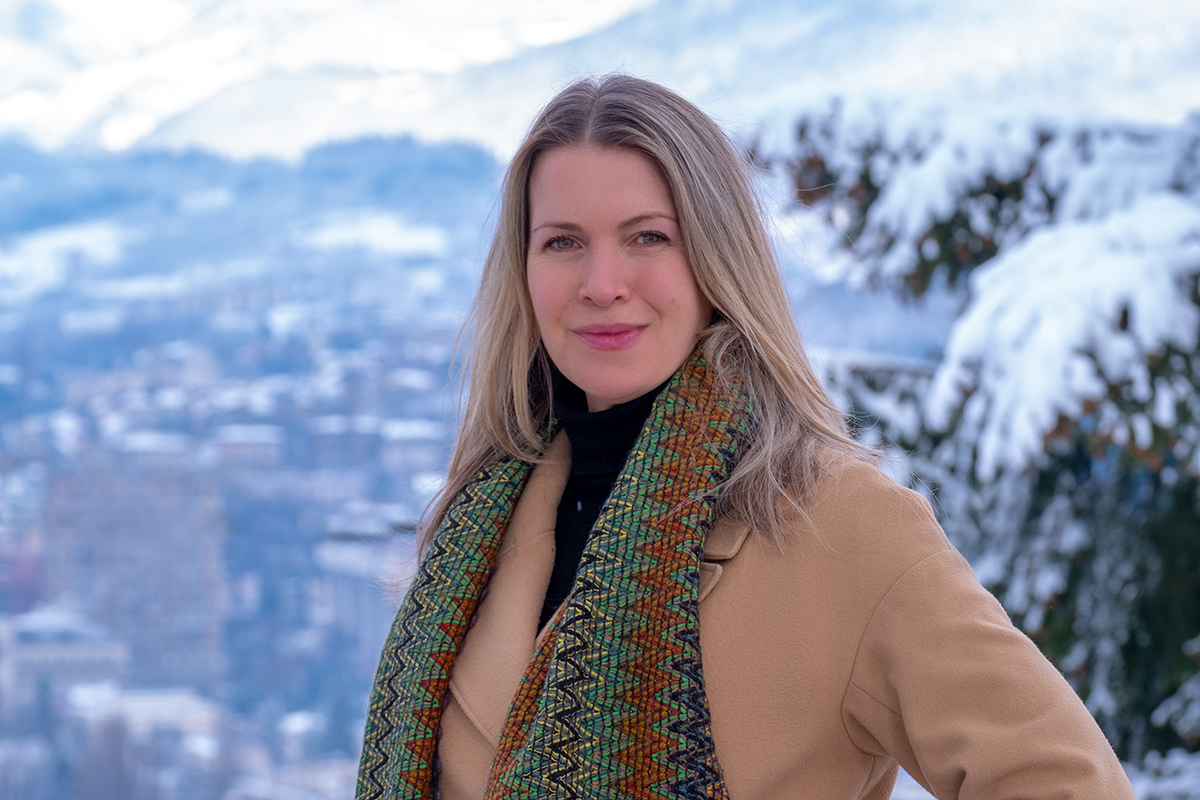Last year, Bosnia and Herzegovina started preparing an environmental strategy and action plan (BiH ESAP 2030+), a tool to reach environmental sustainability. It will also contribute to BiH’s ambitions of becoming a member of the European Union in the long term. Nature is an essential part of daily life for people in Bosnia and Herzegovina as well as in Sweden. With a decades-long experience in contributing to sustainable development and making the environment a high political priority, Sweden is now providing strategic support to BiH’s environmental policy development locally and at the state level.
We met Johanna Strömquist, Swedish Ambassador to BiH, to talk about the strong partnership between Sweden and BiH as well as her work as an ambassador for sustainable development and her relationship with the nature in BiH.

Many readers will be curious about what you do on an everyday basis. Can you explain your role as the Swedish Ambassador in BiH and the Embassy’s work with sustainable development?
No day looks like the other in this job, and that is part of what makes it so interesting. You always have to be ready to adapt to the situation and focus on what is the priority for the moment. Like this spring when Covid-19 first hit. We were repatriating Swedish citizens who got stuck when the airports and borders closed, and in parallel, we were working with our partners here in the country to adjust and increase our support to Bosnia and Herzegovina because of the pandemic. As an ambassador, I lead all the work of the Embassy while representing my country, trying to facilitate cooperation and exchange between Sweden and Bosnia and Herzegovina in all relevant fields. That includes engaging in dialogue and connecting people, whether it be representatives of civil society, politicians, the private sector, or international colleagues. A large part of my work is also to support Bosnia and Herzegovina’s path to the European Union. We support and work with actors – politicians or civil society – that are ready to engage in making necessary reforms happen. In this, our focus is on the rule of law, justice, anti-corruption, and human rights as well as protection of the environment and economic development and economic integration with the EU. I am lucky to have been appointed Swedish ambassador to this country since the relations are so strong between our two countries at all levels, both between institutions and people. It makes it a joy to have been given this honor.
Sustainable development is key in everything we do. Through our financial and technical development cooperation, we support several projects in the field of sustainable development. It includes technical assistance to local authorities to develop strategies and plans, wastewater treatment plants, making public buildings energy efficient, air pollution measures, and educating young people on how to engage in sustainable development. We try to contribute to sustainability through everything we do, whether it is through a project or our internal routines at the Embassy. When building a sustainable society, all our personal contributions are also important, besides public policies and green financing.

The BiH Environmental Strategy and Action Plan will be a critical tool for relevant authorities to reach environmental sustainability in BiH. What do you see as the most prioritised areas in terms of the environment in BiH?
The BiH Environmental Strategy and Action Plan (BiH ESAP) will cover seven environmental areas. Developing all of them simultaneously in an integrated way is crucial for reaching environmental sustainability in BiH in accordance with EU standards. However, some issues are more obvious since they affect people´s everyday lives. One is certainly air pollution. This becomes especially visible this time of the year when the air quality in the big cities get very poor and some days even hazardous and may cause serious health issues. To solve this situation, it will be essential to create alternatives to fossil fuels in the industry, energy, transport, and heating sectors. Also, I want to highlight the importance of protecting BiH´s unique and rich biodiversity and improving the effectiveness of protected areas to keep this beautiful nature healthy for coming generations.
Bosnia and Herzegovina has a very complex environmental governance and management system due to four jurisdictions as well as cantons in FBiH, also sharing part of the environmental policy mandate within FBIH. So, it will be crucial to harmonise the processes between these four jurisdictions and environmental policy development and coordination in the country. Another very important part is that the key stakeholders in BiH agreed that the ESAP should be realistic, achievable, yet also ambitious and share common strategic goals among different government levels in BiH.
In what ways do you think that the ESAP will be useful to authorities and beneficial to the public?
ESAP will give the authorities a strategy and a plan as well as concrete actions to achieve strategic environmental goals. It will be a good starting point for the transition to a more sustainable society and to support a more coherent and effective environmental governance in BiH. The public will enjoy the results: cleaner air, water, soil, and general environment.
In the long-term, the project will also contribute to Bosnia and Herzegovina to fulfill the criteria to become a member of the European Union.
The process to develop the strategy and the plan aims to include the voices of the public and experts outside the government structures based on overall respect and equality in the society. There are more than 400 nominated participants in the ESAP development process from various different stakeholders groups, including authorities, NGOs, experts, academia, business sector representatives, and individuals interested in the environmental sector of BiH. Environmental issues are interrelated with many social issues such as poverty, unemployment, gender inequality etc. So, improving environmental governance is essential to contribute to the safety, health, and wellbeing of the current and future generations.
It is anticipated that the ESAP document will be finalised and then sent for adoption by the governments of BiH by the end of 2021. What kind of partner do you foresee Sweden to be in the implementation of the ESAP?
I am very happy that this important environment strategy will be finalised this year. It will give a great foundation for essential reforms to further align Bosnia and Herzegovina’s environment policy with the EU’s environmental policies. It will also make it easier for Bosnia and Herzegovina to cooperate with the EU on these issues. Sweden will then continue working with partners on the implementation to bring real change to people. The environment is and will remain a very important priority for the Swedish Government globally – and of course, also here in Bosnia and Herzegovina. Sweden is currently the biggest bilateral donor regarding the environment and climate in this country.
We support the strengthening of institutions and reforms at the state and local level and put the focus on environmental investments, such as wastewater treatment, solid waste management, energy efficiency, nature protection, air quality improvement, and safe handling of chemicals. We will also continue to support civil society organizations’ work to raise awareness about the changes that have to be made and share knowledge, innovative solutions, and experiences from Sweden on environmental issues.

Sometimes we get to hear about progress and success stories from Sweden when it comes to environmental issues. Can you share some inspiration from Sweden around environmental policies, environmental protection or environmental technologies and innovation?
Nature is very important to people in Sweden, just like I have noticed it is to people in Bosnia and Herzegovina. It is a place to recharge and to spend time with family and friends. It is clearly something we have in common. We both have spectacular nature that is also a natural resource. But one thing that differs is that Sweden, for many years, has had a strong movement to protect our nature, both in civil society and in politics. This movement started already in the 70s in Sweden, building on generations of love for our nature. That political pressure, in combination with Sweden being one of the top countries in the world regarding innovation, has lead us to focus on finding new solutions for sustainable development.
Climate neutrality and reducing emissions and hazardous toxins, with consideration for people, animals, and nature, is now in focus in Sweden regarding environmental policy. In 2018, this work took a leap forward with the Swedish Climate Act. It is a policy framework including: the Climate Act itself, new goals for emissions reductions, and the setting up of a climate policy council that monitors the activities of the Government. The Act stipulates that Sweden needs to achieve net-zero emissions of greenhouse gases in 2045 and negative emissions thereafter. This is the most important framework ever adopted in Sweden on the topic of environment and climate change. Last year Sweden also adopted a national strategy for a circular economy, and this year Sweden is investing almost 1 million euros in green recovery initiatives. We see climate neutrality as an opportunity for investments, new jobs, modernization, and improved living standards based on the foundation of a more sustainable society.
As for environmental technologies and innovation, there are so many! The new technology that makes the electricity grids smart, the world’s first wireless electric road, climate-smart use of district heating system to warm up aircrafts, Europe’s greenest battery factory, circular water solutions, the world’s first recycling mall outside Stockholm. Our recycling and turning waste into energy have actually been so successful that Sweden imports waste to create energy because we do not have enough ourselves.
Another example is the decarbonisation of heavy industries such as steel production, petrochemicals, and cement. In Sweden, all of these industries have shown a strong commitment to reducing their carbon emissions connected to production. They have themselves laid out a decarbonisation roadmap aligned with the Paris Agreement. The steel industry’s goal is to become carbon neutral and fossil-free in less than 15 years by replacing coal with hydrogen in steel-making processes.
Lastly, can you tell us something about yourself; What is your favourite nature spot in BiH that you can recommend to the readers to visit?
I am an outdoor person, so Bosnia and Herzegovina is amazing for me. Nature here is absolutely spectacular. I go hiking and swimming in summer and skiing in winter, both downhill and cross-country. The Olympic history gives an extra touch to the skiing both in Bjelasnica and Jahorina that I appreciate. Living in Sarajevo and taking the cable car up to Trebevic is lovely all times of the year. I enjoy the beauty of the flowers in spring and summer in the mountains that reminds me of nature in Sweden. And all the different planinarski domovi for some coffee and uštipci with kajmak is always a welcome break!
More about the BiH Environmental strategy and Action Plan 2030+
The primary goal of the BiH ESAP2030+ project is to support the authorities of BiH, FBiH, RS and BD in the ESAP 2030+ development. The ESAP 2030+ document will comprise environmental strategies and action plans for FBiH, RS and BD, and actions that will be taken at the level of BiH. On a long-term basis, the project will improve the environment in BiH and support BiH on its path to EU membership.
The contents of the BiH ESAP 2030+ will address the following seven areas of the Environmental Acquis: Water; Waste; Biodiversity and Nature Conservation; Air Quality, Climate Change and Energy, Chemical Safety and Noise; Sustainable Resource Management; and Environmental Management.
The BiH ESAP 2030+ project is implemented by Stockholm Environment Institute with the support of the Embassy of Sweden in BiH.






